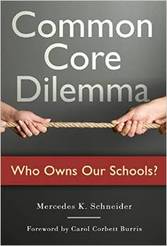This week, both the House and the Senate are promoting their respective versions of the reauthorization of the Elementary and Secondary Education Act (ESEA) of 1965.
A bit of info regarding what transpired July 08, 2015:
On July 08, 2015, the House passed its version, the Student Success Act (HR 5) by a slim margin: 218-213. Only Republicans voted for it. President Obama has said in the past he would veto the bill over such issues as the House version's "per-student basis" Title I funding and its budget caps that do not account for either inflation or enrollment increases.
For a play-by-play record of House legislative activities regarding HR 5, click here and use the calendar feature to view July 08, 2015.
A couple of interesting issues related to HR 5 amendments: First, an opt-out amendment was approved (Rep. Salmon, AZ). Under this amendment, students whose parents opt them out of state testing are not counted against the state participation rate. The Senate ESEA reauthorization version also has an opt-out amendment that was approved in committee, but the Senate opt-out is worded such as to tell states that whether states allow opting out or not, don't blame the federal government (i.e., don't say that ESEA requires students to test).
Another interesting House issue related to HR 5 is one that was sponsored by Rep. Polis (CO) and later withdrawn. Polis' amendment wanted "to require states to have college- and career-ready standards and set performance, growth, and graduation rate targets for all student subgroups. The amendment also includes performance targets for English language learners and students with disabilities." Even though the pro-testing civil rights groups might have supported this one, the amendment was withdrawn "by unanimous consent." Too much of a "federal overreach" feel for Republicans, I assume.
(The actual texts of the Salmon and Polis amendments can be found here. Whereas the Salmon amendment is only a couple of lines long, the Polis amendment is several pages of text.)
But the pendulum was also not allowed to swing too far in the other, relaxed direction: A proposed amendment by Rep. Walker (NC), called the A PLUS Act, would have allowed states great freedom to spend Title I funds. As noted in the House legislative activities log: "A PLUS... would send funding under NCLB back to states in the form of block grants, and states would then be able to direct that funding to any education purpose under state law." However, A PLUS was defeated 195-235. No Democrat voted in favor.
Before the final vote was taken on HR 5, Rep. Esty (CT) wanted to send HR 5 back to the House Ed Committee for the following reason:
DEBATE - The House proceeded with 10 minutes of debate on the Esty motion to recommit with instructions, pending reservation of a point of order. The instructions contained in the motion seek to require the bill to be reported back to the House with an amendment that would guarantee educational opportunities for children with disabilities by requiring that each state: (1) demonstrate their laws do not result in a lower standard of education than for those students without disabilities; (2) grant students with disabilities access to a regular secondary school diploma; (3) give parents the right to informed consent about their child's education; (4) cannot lower expectations or academic achievement for students with disabilities; or (5) give educational opportunities for any student, including those from racial and ethnic minorities. Additionally, the motion requires the Secretary of Education to regulate learning environments in order to protect children with disabilities from abusive seclusion and restraint practices.
The Esty motion failed, 185-244. All who voted in favor were Democrats; all who opposed were Republicans. Again, I'm thinking this motion looked too much like "federal overreach" to the Republicans.
One more note regarding House HR 5: Rep. Rotika's (IN) approved amendment to move the next ESEA reauthorization up to 2019 will model where we are now, in 2015, hashing out ESEA reauth the same year as a presidential election- which is where No Child Left Behind (NCLB) was in 2007, when it was up for reauthorization and stalled for eight years.
Grappling with a politically-charged ESEA reauth every election cycle I view as unrealistic. Consider this tidbit in the November 06, 2007, New York Times regarding the unlikely 2007 reauthorization of NCLB:
Speaking of [2007 NCLB] reauthorization, Terry W. Hartle, senior vice president for government and public affairs at the American Council on Education in Washington, said, "It's dead for this year."
"The more things move into the presidential election year," Mr. Hartle added, "the more the long-term fate of any reauthorization bill becomes problematic."
Moving on to the Senate:
Not much going on here just yet. The details of the Senate ESEA reauth business for July 08, 2015, can be found here. The Senate dealt with four proposed amendments. The biggest news is that Sen. Alexander's push to include vouchers in the Senate ESEA bill was nixed by a vote of 45-52. Only Republicans wanted the vouchers. All Democrats except one abstaining voted against. A few Republicans also voted against.
One last comment: Note that if you hear about the Senate approving an amendment by Sen. Tester on July 08, 2015, it is not the one to curtail annual testing.
Stay tuned, America. More to come.
Originally posted 07-09-15 at deutsch29.wordpress.com
Schneider is a southern Louisiana native, career teacher, trained researcher, and author of the ed reform whistle blower, A Chronicle of Echoes: Who's Who In the Implosion of American Public Education.
She also has a second book, Common Core Dilemma: Who Owns Our Schools?, newly published on June 12, 2015.



